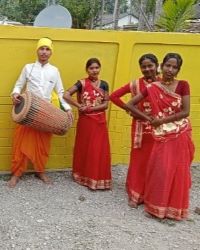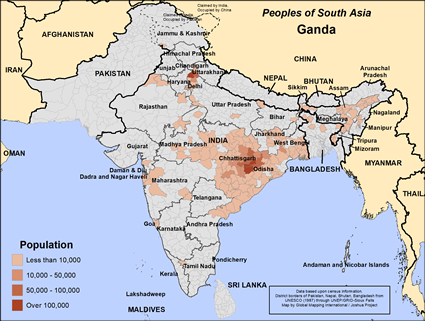Ganda in India

Photo Source:
Anonymous
|

Map Source:
People Group data: Omid. Map geography: UNESCO / GMI. Map Design: Joshua Project.
|
| People Name: | Ganda |
| Country: | India |
| 10/40 Window: | Yes |
| Population: | 1,276,000 |
| World Population: | 1,276,000 |
| Primary Language: | Odia |
| Primary Religion: | Hinduism |
| Christian Adherents: | 0.69 % |
| Evangelicals: | 0.00 % |
| Scripture: | Complete Bible |
| Ministry Resources: | Yes |
| Jesus Film: | Yes |
| Audio Recordings: | Yes |
| People Cluster: | South Asia Dalit - other |
| Affinity Bloc: | South Asian Peoples |
| Progress Level: |
|
Introduction / History
The Ganda or Gandwa is an indigenous community. Under the caste system prevalent all over India, they are considered as untouchables. They are forced to stay in the bottom of the system as scheduled caste and scheduled tribes.
The Ganda are divided into various divisions. These include the Odia, Laria, Kandria/Kandharia, Kabria and Saharia Ganda, which are further divided into a number of totemistic exogamous clans (bansa) like bagh, sika, nag, and podha. These various subcastes are divided based on their occupation.
The Ganda speak Odia, the language of Odisha. They mainly live in Western Odisha and adjoining parts of Chhattisgarh, especially in the districts of Bolanghir and Bargarh.
What Are Their Lives Like?
Their traditional occupations are as weavers of coarse cloth and village watchmen. Others are farmers. The Ganda are also professional pipers and drummers.
They are best known for their special music known as Ganda Baja, which is played for village functions. The music uses drums, pipes, cymbals and sahnai, a bamboo flute. They sing and dance to the accompaniment of their instruments, the dancers generally being two boys dressed as women. They have long hair and put on skirts and half-sleeved jackets. On their right shoulders are attached peacocks' feathers, and colored cloths hang from their back and arms and wave about when they dance.
In the earlier days, Ganda were patronized by important rajas or zamindars and they were essential parts of their festivities. Today, they are patronized by members of other castes to play at festivals.
The music of the Ganda is considered important to communicate with local gramadevata (village deities). On every Monday in Bora Sambar, a region of Bargarh, the priest performs the boil ritual, where the goddess possesses the priest and puts him into a trance. During this time, the Ganda play their instruments to sulo par, 16 rhythms, representing the 16 goddesses. It is said only the Ganda Baja instruments allow this boil to occur, and the playing of the instruments by the Ganda helps the goddess focus her shakti on the priest, who could lose control due to the sheer strength of her power. During this ritual, the priest can heal people who are suffering ailments such as barrenness due to the shakti he channels, thanks to the Ganda orchestra.
Despite their spiritual connection with the goddess, Hindu society still marginalizes them; upper castes bar them from entering the temple. Since they are considered as impure and as untouchables, their touch is considered defiling. A Hindu will not put anything in the hands of the Ganda while holding it himself but will throw it down in front of the Ganda and will take anything from him in the same manner.
They practice adult marriage between one man and one woman. They arrange marriages through family negotiation while respecting the consent of the couple. They allow for the remarriage of widows, widowers and divorcees. When one spouse dies, this community encourages marriage to a sibling of the deceased. The betrothal is marked by a present of various articles to the father of the bride.
They practice both cremation and burial to dispose of their dead. The dead are buried when the family cannot afford the fuel required for cremation. A man is laid on his face in the grave and a woman on her back. They mourn for three days, except in the case of children under three years old, whose deaths entail no special observances. They give a feast on the fourth day. When all have been served, the chief mourner takes a little food from the plate of each guest and puts it in a leaf-cup. He takes another leaf-cup full of water and places the two outside the house, saying "Here is food for you" to the spirit of the departed.
What Are Their Beliefs?
The Ganda are Hindus, and their principal deity is Dulha De. They observe Hindu fasts and festivals. During the festival of Dasahra, they worship their musical instruments and the weaver's loom, both being their source of livelihood.
Being considered impure, they do not revere the tulsi plant or the banyan or p?pal trees, which are usually considered sacred by other Hindus.
What Are Their Needs?
The people need to put their trust and identity in the hands of the loving God of Creation who sent his son to make it possible for them to enter his Kingdom.
Prayer Points
Pray for the Lord to bless the Ganda community economically and spiritually.
Pray for the culture to be renewed and enhanced by the work of the Holy Spirit to be shaped into a God-centered and God-honoring mold.
Pray for the Holy Spirit to move among their family and community leaders to seek his face and enjoy his blessings.
Pray that the missionaries who try to reach them will have no hindrance to preach the gospel and nurture disciples.
Ask God to raise up Ganda people who are more desirous to know the truth than to stay within their traditional spiritual beliefs.
Ask God to send loving, committed workers to the Gandas in the near future.
Pray for many of them to be disciples who will make even more disciples.